Plankton, bats, primates, fungi and bees - which species would have the greatest impact on our planet if it were lost? Five experts set out their case public debate in London next Thursday
Jessica AldredFungi
'It keeps the trees alive, recycles waste and helps us'
Professor Lynne Boddy of the Cardiff School of Biosciences
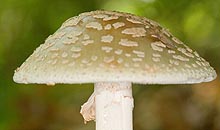
Fungi have a bad reputation, usually being thought of as poisoners, rotters of food and homes, causes of plant disease and human infections (eg athlete's foot). In fact, very few fungi cause a nuisance. Moreover, without fungi humans could not exist. Most terrestrial plants obtain their nutrients and water from soil through fungi associated with their roots. Furthermore, fungi are the main garbage disposal agents and nutrient recyclers of the natural world. They are hugely important as food for soil animals and in producing human food, eg Quorn, cheese, chocolate and soft drinks. Fungi produce many "wonder drugs" including penicillin and statins to control cholesterol.
Within this vast kingdom of organisms that is so crucial to our very existence, it is hard to single out just one species. However, my choice would be Amanita muscaria, the fly agaric. This fungus forms mycorrhizas with the roots of forest trees, providing them with water, mineral nutrients, protection from pathogens and some pollutants. It also recycles dead organic matter. It is used as a food source by some animals, and produces powerful chemicals that may turn out to yield novel pharmaceuticals.
Bees
'Bees are irreplaceable. Their loss will be catastrophic'
Dr George McGavin of the Oxford University Museum of Natural History
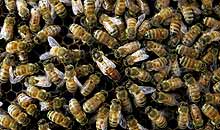
The partnership between flowering plants and pollinating insects, especially bees, is one of the most widespread and significant symbiotic interactions on Earth. This 100m-year-old collaboration has spawned a rich diversity of species and promoted the rise to dominance of humans.
Now the need to feed our burgeoning population, coupled with the agricultural means to that end – a plethora of pesticides, the unabated loss of natural habitat and the translocation of alien species and diseases - are driving wild and managed bee populations into a very steep decline. Seventy percent of the crop species eaten by humans depend wholly or partly on pollination and recent estimates put the economic value of insect pollination at over £121 billion ($192bn) - representing at least 10% of the value of the world's agricultural production.
Bees are irreplaceable and the debate about what might happen if they disappeared is no longer academic. We have set in motion processes that may lead to the extinction of the planet's most important pollinators along with countless other species that depend on them. Not only will the world be a much less colourful place, it will also be poorer in every other way imaginable. The effects will be nothing short of catastrophic.
Plankton
'Plankton are the base of the whole food web'
Professor David Thomas of the School of Ocean Sciences, University of Bangor
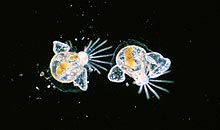
Plankton is a collective term for a myriad of bacteria, viruses, plant-like microbes and small animals that drift at the mercy of the winds and the ocean currents and wind. They are the base of the whole food web that lives in just about any body of water you care to imagine: from your bird bath in the garden up to the vast oceans that cover most of the planet.
Temperature extremes hold no bounds and plankton survive being encased in ice in our Arctic and Antarctic oceans and can survive near boiling waters in hot springs. Not only that, but plankton cells can be carried large distance in aerosols in the wind, and some people even believe they can survive in space. They not only fuel aquatic ecosystems, but some release gases that can influence cloud formation and therefore global climate.
But apart from how vital the plankton are to running planet Earth, they are simply beautiful to look at. Plankton have been an inspiration to artists and designers ever since the first microscopes were invented, and plankton inspired design can be found on a whole range of scales from buildings to wheel hubs.
Bats
'Bats provide a number of these essential services'
Dr Kate Jones of the Zoological Society of London
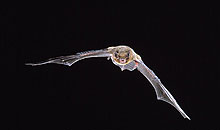
We are in the midst of a mass extinction of this planet's life brought about by humans monopolising global resources and changing global climate patterns. Many species provide essential services eg, disease control, clean water, pollination and insect regulation, and we are now faced with an agony of choice. Given finite amounts of conservation dollars, which species can we not do without? I present the case for bats.
Bats provide a number of these essential services; for example without bats many commercially important crops such as bananas, mangoes, dates and tequila would fail. Insects consumed by bats translate to millions of dollars saved on pesticides. Bats are also indicators of general ecosystem health and monitoring their populations provides us with early warning systems of irreversible damage.
Bats also have many irreplaceable traits, they are the only mammals to use powered flight, can hunt and navigate in the pitch darkness using only sonic echoes, provide the imagery of Dracula and the flying creatures of Halloween. Perhaps some of us couldn't cope with fewer fungi in our lives, green goo in our rivers, bees to sting and annoy, and primates that one day might rise to overthrow us, but to me a world without bats is unthinkable.
Primates
'Primate habitats provide ecosystem services we all depend upon'
Ian Redmond, chief consultant of the great apes survival project
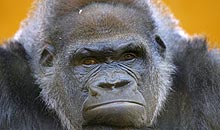
Monkeys, apes and lemurs must be saved, not just because they share so much DNA with humans (although blood is thicker than water, so this convinces many people), not because they are fascinating research subjects (though clearly they are), not because they are intelligent social mammals who have every right to exist (though arguably they do); not even because primate-watching can form the basis of multimillion-pound tourist industries, creating jobs and lifting rural communities out of poverty.
Any one of these would be reason enough to fight for the survival of our zoological next-of-kin, but I would argue that their ecological role as keystone species in tropical and sub-tropical forests is more important.
Primate habitats provide ecosystem services we all depend upon – especially absorbing carbon while releasing oxygen through photosynthesis and pumping water into the atmosphere through evapo-transpiration, which drives global rainfall patterns. What most people fail to recognise, however, is that primates sow the trees of tomorrow by dispersing seeds in their dung.
If we want these forests to be a permanent carbon store, a source of clean water and to regulate our climate in future, we had better not kill the gardeners of the forest today.
• The Earthwatch debate Irreplaceable - the world's most invaluable species, takes place from 7-9pm at the Royal Geographical Society in London on Thursday November 20. Free to current Earthwatch supporters, but by ticket only. For all others, a donation will be requested on the door. Doors open 6pm (cash bar). The debate will be followed by an optional buffet supper with wine, £25. For tickets and information please call ![]()

![]()
![]()

![]()
![]()
![]()
![]()
![]()
![]()
![]() +44 (0)1865 318856
+44 (0)1865 318856![]() or email events@earthwatch.org.uk
or email events@earthwatch.org.uk



No comments:
Post a Comment